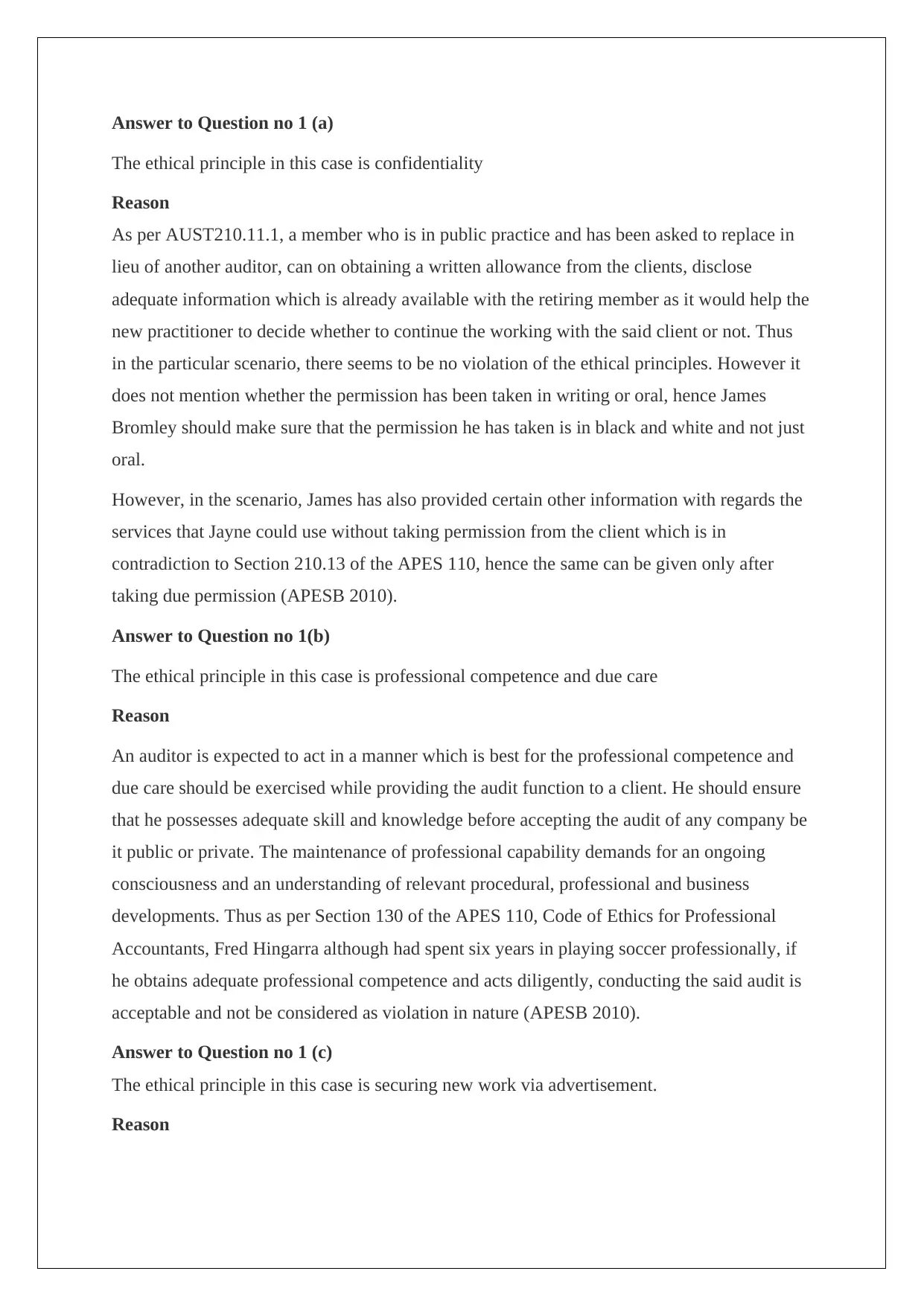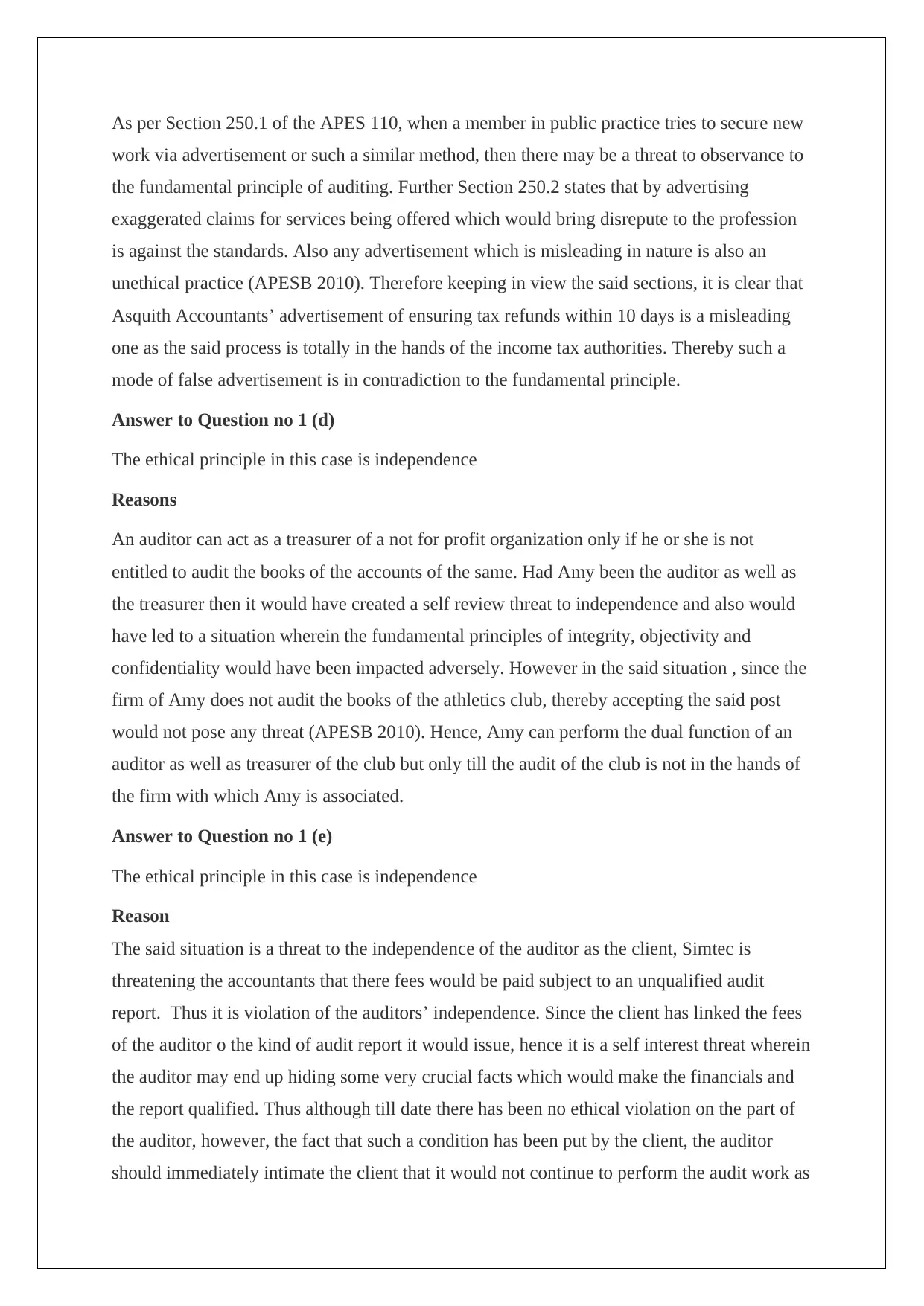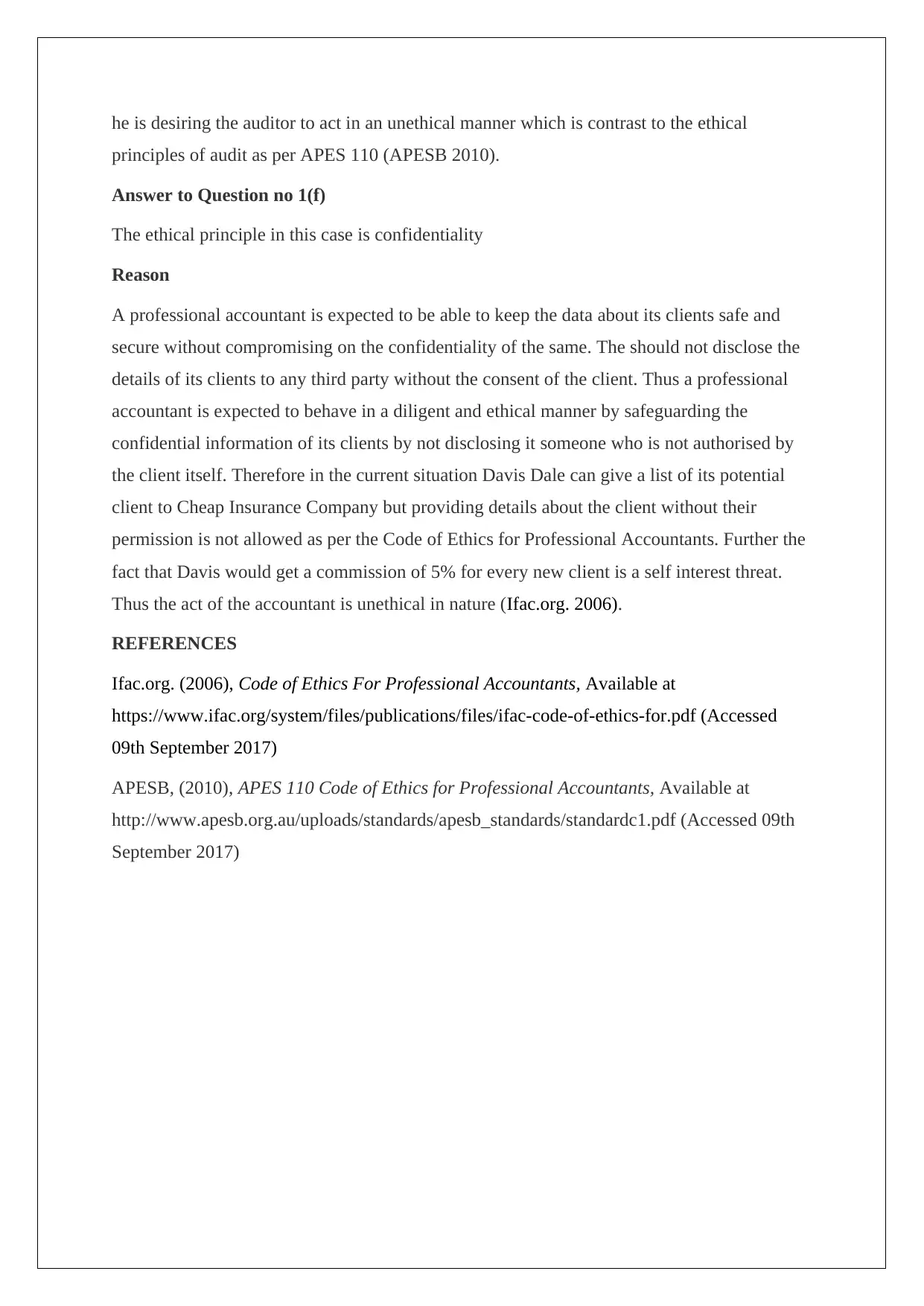APES 110 Ethical Principles
VerifiedAdded on 2019/11/14
|3
|1100
|103
Homework Assignment
AI Summary
This solved assignment addresses several ethical dilemmas based on APES 110, the Code of Ethics for Professional Accountants. Each question explores a different ethical principle, including confidentiality, professional competence and due care, independence, and the ethical implications of advertising and securing new work. The solutions analyze each scenario, referencing relevant sections of APES 110 and other professional accounting standards to determine whether ethical violations have occurred or potential threats exist. The assignment demonstrates the importance of maintaining professional integrity, objectivity, and adherence to ethical guidelines in the practice of accounting and auditing.

Answer to Question no 1 (a)
The ethical principle in this case is confidentiality
Reason
As per AUST210.11.1, a member who is in public practice and has been asked to replace in
lieu of another auditor, can on obtaining a written allowance from the clients, disclose
adequate information which is already available with the retiring member as it would help the
new practitioner to decide whether to continue the working with the said client or not. Thus
in the particular scenario, there seems to be no violation of the ethical principles. However it
does not mention whether the permission has been taken in writing or oral, hence James
Bromley should make sure that the permission he has taken is in black and white and not just
oral.
However, in the scenario, James has also provided certain other information with regards the
services that Jayne could use without taking permission from the client which is in
contradiction to Section 210.13 of the APES 110, hence the same can be given only after
taking due permission (APESB 2010).
Answer to Question no 1(b)
The ethical principle in this case is professional competence and due care
Reason
An auditor is expected to act in a manner which is best for the professional competence and
due care should be exercised while providing the audit function to a client. He should ensure
that he possesses adequate skill and knowledge before accepting the audit of any company be
it public or private. The maintenance of professional capability demands for an ongoing
consciousness and an understanding of relevant procedural, professional and business
developments. Thus as per Section 130 of the APES 110, Code of Ethics for Professional
Accountants, Fred Hingarra although had spent six years in playing soccer professionally, if
he obtains adequate professional competence and acts diligently, conducting the said audit is
acceptable and not be considered as violation in nature (APESB 2010).
Answer to Question no 1 (c)
The ethical principle in this case is securing new work via advertisement.
Reason
The ethical principle in this case is confidentiality
Reason
As per AUST210.11.1, a member who is in public practice and has been asked to replace in
lieu of another auditor, can on obtaining a written allowance from the clients, disclose
adequate information which is already available with the retiring member as it would help the
new practitioner to decide whether to continue the working with the said client or not. Thus
in the particular scenario, there seems to be no violation of the ethical principles. However it
does not mention whether the permission has been taken in writing or oral, hence James
Bromley should make sure that the permission he has taken is in black and white and not just
oral.
However, in the scenario, James has also provided certain other information with regards the
services that Jayne could use without taking permission from the client which is in
contradiction to Section 210.13 of the APES 110, hence the same can be given only after
taking due permission (APESB 2010).
Answer to Question no 1(b)
The ethical principle in this case is professional competence and due care
Reason
An auditor is expected to act in a manner which is best for the professional competence and
due care should be exercised while providing the audit function to a client. He should ensure
that he possesses adequate skill and knowledge before accepting the audit of any company be
it public or private. The maintenance of professional capability demands for an ongoing
consciousness and an understanding of relevant procedural, professional and business
developments. Thus as per Section 130 of the APES 110, Code of Ethics for Professional
Accountants, Fred Hingarra although had spent six years in playing soccer professionally, if
he obtains adequate professional competence and acts diligently, conducting the said audit is
acceptable and not be considered as violation in nature (APESB 2010).
Answer to Question no 1 (c)
The ethical principle in this case is securing new work via advertisement.
Reason
Paraphrase This Document
Need a fresh take? Get an instant paraphrase of this document with our AI Paraphraser

As per Section 250.1 of the APES 110, when a member in public practice tries to secure new
work via advertisement or such a similar method, then there may be a threat to observance to
the fundamental principle of auditing. Further Section 250.2 states that by advertising
exaggerated claims for services being offered which would bring disrepute to the profession
is against the standards. Also any advertisement which is misleading in nature is also an
unethical practice (APESB 2010). Therefore keeping in view the said sections, it is clear that
Asquith Accountants’ advertisement of ensuring tax refunds within 10 days is a misleading
one as the said process is totally in the hands of the income tax authorities. Thereby such a
mode of false advertisement is in contradiction to the fundamental principle.
Answer to Question no 1 (d)
The ethical principle in this case is independence
Reasons
An auditor can act as a treasurer of a not for profit organization only if he or she is not
entitled to audit the books of the accounts of the same. Had Amy been the auditor as well as
the treasurer then it would have created a self review threat to independence and also would
have led to a situation wherein the fundamental principles of integrity, objectivity and
confidentiality would have been impacted adversely. However in the said situation , since the
firm of Amy does not audit the books of the athletics club, thereby accepting the said post
would not pose any threat (APESB 2010). Hence, Amy can perform the dual function of an
auditor as well as treasurer of the club but only till the audit of the club is not in the hands of
the firm with which Amy is associated.
Answer to Question no 1 (e)
The ethical principle in this case is independence
Reason
The said situation is a threat to the independence of the auditor as the client, Simtec is
threatening the accountants that there fees would be paid subject to an unqualified audit
report. Thus it is violation of the auditors’ independence. Since the client has linked the fees
of the auditor o the kind of audit report it would issue, hence it is a self interest threat wherein
the auditor may end up hiding some very crucial facts which would make the financials and
the report qualified. Thus although till date there has been no ethical violation on the part of
the auditor, however, the fact that such a condition has been put by the client, the auditor
should immediately intimate the client that it would not continue to perform the audit work as
work via advertisement or such a similar method, then there may be a threat to observance to
the fundamental principle of auditing. Further Section 250.2 states that by advertising
exaggerated claims for services being offered which would bring disrepute to the profession
is against the standards. Also any advertisement which is misleading in nature is also an
unethical practice (APESB 2010). Therefore keeping in view the said sections, it is clear that
Asquith Accountants’ advertisement of ensuring tax refunds within 10 days is a misleading
one as the said process is totally in the hands of the income tax authorities. Thereby such a
mode of false advertisement is in contradiction to the fundamental principle.
Answer to Question no 1 (d)
The ethical principle in this case is independence
Reasons
An auditor can act as a treasurer of a not for profit organization only if he or she is not
entitled to audit the books of the accounts of the same. Had Amy been the auditor as well as
the treasurer then it would have created a self review threat to independence and also would
have led to a situation wherein the fundamental principles of integrity, objectivity and
confidentiality would have been impacted adversely. However in the said situation , since the
firm of Amy does not audit the books of the athletics club, thereby accepting the said post
would not pose any threat (APESB 2010). Hence, Amy can perform the dual function of an
auditor as well as treasurer of the club but only till the audit of the club is not in the hands of
the firm with which Amy is associated.
Answer to Question no 1 (e)
The ethical principle in this case is independence
Reason
The said situation is a threat to the independence of the auditor as the client, Simtec is
threatening the accountants that there fees would be paid subject to an unqualified audit
report. Thus it is violation of the auditors’ independence. Since the client has linked the fees
of the auditor o the kind of audit report it would issue, hence it is a self interest threat wherein
the auditor may end up hiding some very crucial facts which would make the financials and
the report qualified. Thus although till date there has been no ethical violation on the part of
the auditor, however, the fact that such a condition has been put by the client, the auditor
should immediately intimate the client that it would not continue to perform the audit work as

he is desiring the auditor to act in an unethical manner which is contrast to the ethical
principles of audit as per APES 110 (APESB 2010).
Answer to Question no 1(f)
The ethical principle in this case is confidentiality
Reason
A professional accountant is expected to be able to keep the data about its clients safe and
secure without compromising on the confidentiality of the same. The should not disclose the
details of its clients to any third party without the consent of the client. Thus a professional
accountant is expected to behave in a diligent and ethical manner by safeguarding the
confidential information of its clients by not disclosing it someone who is not authorised by
the client itself. Therefore in the current situation Davis Dale can give a list of its potential
client to Cheap Insurance Company but providing details about the client without their
permission is not allowed as per the Code of Ethics for Professional Accountants. Further the
fact that Davis would get a commission of 5% for every new client is a self interest threat.
Thus the act of the accountant is unethical in nature (Ifac.org. 2006).
REFERENCES
Ifac.org. (2006), Code of Ethics For Professional Accountants, Available at
https://www.ifac.org/system/files/publications/files/ifac-code-of-ethics-for.pdf (Accessed
09th September 2017)
APESB, (2010), APES 110 Code of Ethics for Professional Accountants, Available at
http://www.apesb.org.au/uploads/standards/apesb_standards/standardc1.pdf (Accessed 09th
September 2017)
principles of audit as per APES 110 (APESB 2010).
Answer to Question no 1(f)
The ethical principle in this case is confidentiality
Reason
A professional accountant is expected to be able to keep the data about its clients safe and
secure without compromising on the confidentiality of the same. The should not disclose the
details of its clients to any third party without the consent of the client. Thus a professional
accountant is expected to behave in a diligent and ethical manner by safeguarding the
confidential information of its clients by not disclosing it someone who is not authorised by
the client itself. Therefore in the current situation Davis Dale can give a list of its potential
client to Cheap Insurance Company but providing details about the client without their
permission is not allowed as per the Code of Ethics for Professional Accountants. Further the
fact that Davis would get a commission of 5% for every new client is a self interest threat.
Thus the act of the accountant is unethical in nature (Ifac.org. 2006).
REFERENCES
Ifac.org. (2006), Code of Ethics For Professional Accountants, Available at
https://www.ifac.org/system/files/publications/files/ifac-code-of-ethics-for.pdf (Accessed
09th September 2017)
APESB, (2010), APES 110 Code of Ethics for Professional Accountants, Available at
http://www.apesb.org.au/uploads/standards/apesb_standards/standardc1.pdf (Accessed 09th
September 2017)
⊘ This is a preview!⊘
Do you want full access?
Subscribe today to unlock all pages.

Trusted by 1+ million students worldwide
1 out of 3
Related Documents
Your All-in-One AI-Powered Toolkit for Academic Success.
+13062052269
info@desklib.com
Available 24*7 on WhatsApp / Email
![[object Object]](/_next/static/media/star-bottom.7253800d.svg)
Unlock your academic potential
Copyright © 2020–2026 A2Z Services. All Rights Reserved. Developed and managed by ZUCOL.





